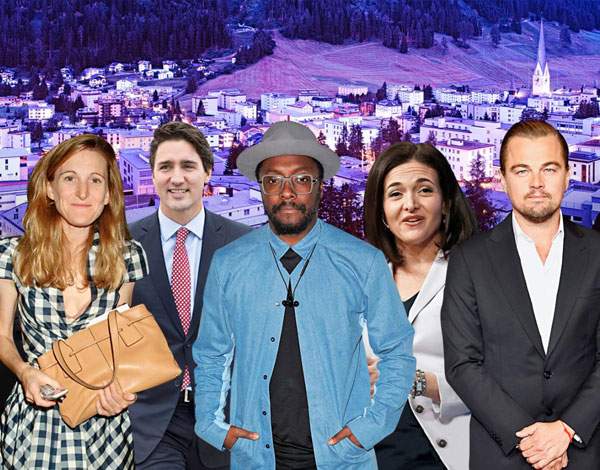
Stephen Hill rakes the mountainside for wisdom, but finds little worth hearing

The World Economic Forum is over for another year – thank God! A total waste of good caviar and champagne (and jet fuel) as the usual suspects spell out the obvious – all of which they could have read in their newspapers anyway.
Sir Martin Sorrell bored everyone for himself, informing us that slowed growth is the new normal (as if we didn’t know) and he banged on that the EU is vital for UK businesses – and we all know why he says that too: it’s because WPP is the media agent for most of the FTSE 250, and the EU is good for big business as they have the funds to lobby and fix the system in their favour, thus supporting his £44 million annual pay.
Christine Lagarde turned up to hear what’s cooking. She talked about China as if she knew what was happening, and then warns the EU of the cost and dangers of immigration – again, as if we didn’t know. But we know something she doesn’t: the politicians cannot do anything as Brussels doesn’t know what it’s doing. We know that a collapse of the Schengen Area, as Sovereign Nations take their own borders back into their own hands, and a Brexit will bring an end to the charade that the EU actually is, well, just a charade for get-quick-rich politicos and their flunkies and hangers-on, and Big Business. Lagarde even warns us of the dangers of a Brexit!
There was only one conversation worth hearing, and that was before the Forum even began: William White, a former chief economist at the Bank for International Settlements (now chairman of the OECD’s Oversight Committee) pointed out the error central bankers have been making since 1987, when they opened the credit spigots far too much, and have done so ever since and on an increasing scale. With each crisis, they have borrowed from the future to right the present – known as ‘Inter-temporal Smoothing’ – but the central banks have no macro-economic ammunition left after the 2007 crash.
QE and low rates at the Fed created a surge of dollar borrowing across East Asia and in emerging markets and they were seen as a solution to the crisis, but have now become part of the problem too. EU banks have a trillion dollars of non-performing assets to be written off; and combined public and private debt in emerging markets is now 185% of GDP, and 265% in the OECD countries, both up by 35% since the top of the last credit splurge in 2007.
Well, I have found over time that you cannot spend the same money twice: the global economy is in a debt trap. If the central bankers raise rates, there will be a very painful adjustment for indebted governments and citizens, and if they don’t it will just make matters worse. They are meant to deal with liquidity problems, not solvency issues, which are governmental matters. They are now caught in this debt trap of their own making.
What happens next? Mr. White doesn’t know and nor do I. The ship has lost its anchor; a Chinese devaluation could trigger something nasty. Mr. White thinks the central bankers should have let a benign deflation run its course, and presumably allowed the inevitable write-offs to begin slowly now, rather than creating new asset bubbles in property and stock markets for bigger write-offs in the next crash. But we both smell an Irving Fisher debt/deflation moment coming next time – and it could be major, as this column has warned more than once before. Davos was just a waste of Time and tomorrow’s money, as Draghi proved yet again as he jumped up to herald more QE – QED.








